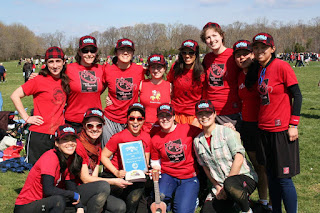Wednesday, November 23, 2011
Thanksgiving
Monday, August 22, 2011
dots and funnels
Thursday, July 7, 2011
adventures in the west: the wildlife



Sunday, July 3, 2011
adventures in the west: the beautiful views
Enjoy!
-




Tuesday, June 14, 2011
one year and two days
Monday, May 23, 2011
crash course in public speaking
My first presentation was to the Board of Directors about two research projects, one that another senior researcher is doing and another one that I'm leading. The second was for an event hosted by the Women's Information Network (WIN), a panel titled "Social Security on the Rocks: What's at Stake for Younger Women." For a write-up of the event, check out my co-worker and friend Jennifer Clark's blog post! I spoke about the specific importance of Social Security to women of color and the anti-poverty effect of the program. Here's a very unflattering photo of me speaking on the issue and a better photo of Melissa Byrne from the Strengthen Social Security Campaign (another panelist) and myself.
I am happy to report that both events went very well, and that I received lots of positive feedback from IWPR staff, members of the Board, as well as the young women professionals that attended the WIN event. I learned a number of things about public speaking and research-based presentations from these two opportunities. Among these lessons:
- When possible, try to stand when giving a presentation; it makes you feel more empowered.
- You do not need to hit every point on each power point slide, some details are just left up there as a reference for the audience.
- Don't over-rehearse, but make sure you get comfortable with the numbers and technical terminology you'll be using.
- Use your hands to emphasize your points; don't hold them behind your back or cross your arms.
- Stand with your weight distributed evenly, and stand up straight.
- Engage the audience with eye contact. If you're nervous, pick someone who seems to be responsive to what you're saying.
This doesn't mean I won't be nervous for my next speaking engagement, but I'm glad that these went well!
Tuesday, April 26, 2011
speaking up
Monday, April 18, 2011
nam june paik

Thursday, April 14, 2011
bullies and hypocrites
However, there are a few things about this city that makes me want to move away as soon as possible: the hypocrisy and the bullying. Here are some examples:
- Environmentalists who take 30-minute showers and drive two blocks to the grocery store.
- Advocates for the impoverished who seem to think that they deserve an award for donating $10 to a local food bank.
- Senior staff at supposedly progressive organizations that treat their junior staff like indentured servants because they can.
- Meetings where we discuss supports for low-income workers but everyone at the table is from upper middle-class families and wearing pearls and carry Longchamp bags.
- Self-identified non-racists and proponents of diversity who get nervous and scared around people from certain racial/ethnic groups.
- People who pronounce mature as "muh-toor" and negotiation as "nego-cee-ation"
Okay, last one in the list? I kid. I KIDDING...though it does bother me. But seriously. I simultaneously love our nation's capital and want to run away screaming with nothing but a backpack containing cleats, a frisbee, my gifted copy of Middlesex, my journal, a picture of my family, and a few plaid shirts.
Oh, and polar bear. But he probably wouldn't fit in my backpack, so I would have to hold him in my arms, which would seriously restrict my ability to run as quickly and as dramatically away from this place as I would sometimes like to do.
The initial rage that I was feeling when I started writing this post has subsided. But maybe you get the gist of it all. Essentially - the one place where I would expect the idealists and do-gooders to convene, our nation's capital, is the the first place that I've been where I've been made to feel as though my idealism and hopes for the future have been stomped on. If anything, this stint in our nation's capital has taught me that it doesn't matter what you think or try to do, this is just how it is. Whoever's got the most money, whoever was brought up in the most comfortable of settings, whoever can yell the loudest, whoever sticks best to the latest trends...those are the people that our country repeatedly puts up on a pedestal to change things. And that's why nothing's changed.
Friday, April 8, 2011
look at that f*ckin' WHIPSTER

Monday, April 4, 2011
the cherry blossoms!


Thursday, March 24, 2011
crap in south dakota
Tuesday, March 22, 2011
workin' out
IWPR blog post: part 2
Thursday, March 17, 2011
japan
Monday, March 14, 2011
birthday
 A while ago, one of my close friends (Sara, actually), asked me something very interest. She asked me if I thought I might have a different idea of birthdays and felt differently around my birthday compared to other people because I had always had to share this day. While for others, birthdays are often an opportunity take a moment and celebrate oneself, I always shared it with someone, and made sure to call and write cards and send gifts around the time I was celebrating my own additional year of life. She wondered if that changed how I person treats his or her birthday.
A while ago, one of my close friends (Sara, actually), asked me something very interest. She asked me if I thought I might have a different idea of birthdays and felt differently around my birthday compared to other people because I had always had to share this day. While for others, birthdays are often an opportunity take a moment and celebrate oneself, I always shared it with someone, and made sure to call and write cards and send gifts around the time I was celebrating my own additional year of life. She wondered if that changed how I person treats his or her birthday. Sunday, March 13, 2011
spring!


 Wellesley friends, my winter league games, my weekly winter league games, a free National Symphony Orchestra concert with Alex at the Kennedy Center, some lovely dinners, a "Friendsgiving" event which was essentially a massive Thanksgiving-themed potluck, viewing of an independent film about campaign financing pertaining to the agriculture and energy industries, and I also got to celebrate Sara's numerous graduate school acceptances!
Wellesley friends, my winter league games, my weekly winter league games, a free National Symphony Orchestra concert with Alex at the Kennedy Center, some lovely dinners, a "Friendsgiving" event which was essentially a massive Thanksgiving-themed potluck, viewing of an independent film about campaign financing pertaining to the agriculture and energy industries, and I also got to celebrate Sara's numerous graduate school acceptances!
 On our way to the Chinatown metro stop, we passed the lovely magnolia trees pictured above, and noticed that the blossoms were beginning to emerge. Temperature in the 60s? Check. Blue skies? Check. Sunshine? Check. Budding flowers? Check. I'd say Spring has arrived!
On our way to the Chinatown metro stop, we passed the lovely magnolia trees pictured above, and noticed that the blossoms were beginning to emerge. Temperature in the 60s? Check. Blue skies? Check. Sunshine? Check. Budding flowers? Check. I'd say Spring has arrived!Saturday, March 12, 2011
quote
Sunday, March 6, 2011
almond rice w/sautéed kale

Friday, March 4, 2011
IWPR blog post!
Bloggers, policy experts, and politicians are urging young Americans to care more about Social Security, whether they are asking us to love it, hate it, tweak it, or scrap it. But the results are already in: we care.
And if we could have it our way, Social Security would be here forever.
According to findings from an AARP report, the vast majority of people of all ages believe that Social Security is important, including 90 percent of those aged 18-29. A recent Institute for Women’s Policy Research (IWPR) survey confirms this sentiment among young adults: 63 percent of those aged 18-39 don’t support cutting Social Security benefits for deficit reduction and more than 60 percent of the group don’t think we pay enough for Social Security.
People my age (somewhere in my 20s) have grown up knowing and expecting that Social Security will be there for us in the future. Another IWPR report shows just how vital the program is for older Americans. It provides 50 percent or more of income for more than half of all men and women over the age of 65. Social Security also kept over 14 million people over the age of 65 out of poverty in 2009, 60 percent of whom are women.
In the wake of the Great Recession, American households saw their savings, home equity, and investments slip away, leaving many scrambling for resources. Pension payouts and asset values rise and fall with the tumultuous economy, and earnings remain uncertain in the face of high unemployment. But Social Security has remained a steadfast source of income in both good and bad times.
It is clear that Social Security will be important when we face retirement. But as the discussion remains focused on current retirees and deficit projections for future decades, it is easy to lose sight of the fact that the Social Security debate needs our attention now and will affect us – young workers – more than anyone else.
Why is our voice important now?
Some of us already need Social Security.
If you’re like me and my friends, the term Social Security conjures up images of old age and years that lie far ahead. However, as of December 31, 2010, approximately 3.2 million children under the age of 18 were receiving Social Security benefits as children of disabled, deceased, or retired workers. 949,000 disabled children over the age of 18 were receiving benefits, as well. More than a third of Social Security beneficiaries are not retired workers. To some among us, Social Security is not only a promise of security when we are old, it is vital now.
We are already paying for and earning our retirement security.
Take a look at your most recent pay stub. It shows that you have had 4.2 percent of your wages withheld for the payroll tax, and therefore, Social Security; before the December 2010 tax package was passed, that amount was 6.2 percent of wages. The inflammatory media anddisconnected politicians have hammered away at the misguided notion that the exhaustion of the Social Security trust fund means ruin for us all. Their hypocrisy lies in the fact that younger people are told to worry and care about our future, yet policymakers give us even more of a reason to worry by threatening to cut and weaken the very program that would ensure income security for us in old age. Meanwhile, working Americans, including those our age, have been paying into Social Security with the expectation that we will receive the benefits that we have earned when it comes time to claim them.
Young Americans want Social Security to stay and stay secure.
We’ve heard the miscalculated and misrepresented statistics and the apocalyptic fear-mongering about this vital program. Now, it’s time that the naysayers listen to what young people have been saying all along.
Monday, February 28, 2011
my hair did













